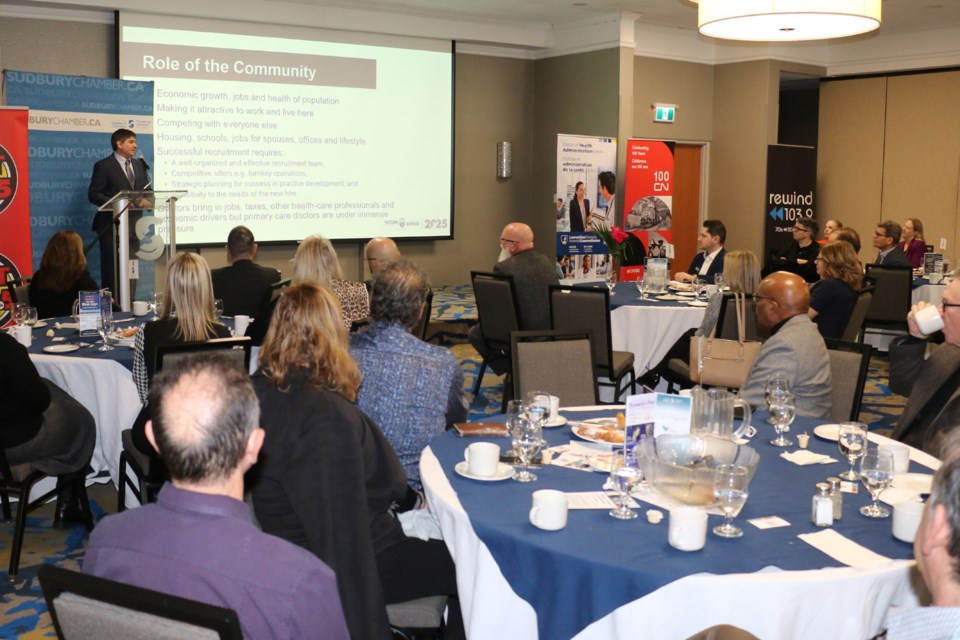The next graduating class at NOSM University will see that medical school reaching the milestone of having more than 1,000 graduates since the school opened nearly 20 years ago.
Dr. Michael Green, the president, vice-chancellor, dean and CEO of NOSM University, told a crowd at the Radisson Hotel in downtown Sudbury Feb. 11 that the fact those graduates exist is a key indicator of the social and economic impact that NOSM has had on Northern Ontario over the years.
Green was the keynote speaker at the Greater Sudbury Chamber of Commerce president's lecture series.
"We have graduated almost 1,000 physicians," Green told the audience. He said the milestone will be reached by the 20th anniversary graduating class later this year. The audience applauded.
"You can see there we have a significant number of Indigenous and Francophone students. That's part of our focus in ensuring that we have good diversity of our medical workforce, and particularly learners who may not have had as many opportunities in the past to go to medical school, and particularly those that are present here in Northern Ontario."
Green said that when a student graduates medical school, the next step is to encourage them to stay in Northern Ontario to complete their residency training — anywhere from two to seven years — where the MDs can choose a specialty such as pediatrics, obstetrics and gynecology or family medicine. He said one of NOSM's goals is to convinced students to do their residency training in the North.

"If we get a student who's done both medical school and residency training here, over 90 per cent stay in practice in Northern Ontario, long term, which is pretty good, you know.”
Green said that in travelling across Northern Ontario it is now evident in most of the smaller communities, as well as in some of the larger communities, that close to 50 per cent of the local physicians are either NOSM medical school graduates or have graduated from NOSM residency programs.
He said the importance of NOSM is that it encourages graduates to stay in the North. Green said there is an economic payoff from that.
"We know that there's an economic impact for health care. Having good health care in your communities has both a direct and indirect impact for businesses. I'm sure you all know that when recruiting people, one of the things people probably ask you is, can I get a doctor? Can I get a family doctor? What's health care like in my community?" Green told the audience of business leaders.
"So building this capacity is important. It is important to enable growth, growth for business and keeping a healthy workforce," he said.
Green also spoke of the need for local cities and towns to help the medical community by making their cities and towns attractive places to stay, work and live for new physicians.
Green appealed to the business people in the audience to help the medical school in pitching and selling their communities to new graduates. He said despite having advanced educations, not all physicians are adept at running a business like a small-town medical practice.
"We really need assistance in providing the turnkey operations that will make it attractive for our graduates to stay in the North," said Green.
"They need to know that there's jobs for them, that there'll be jobs that will be a good work-life balance, that they won't have to become an expert in business and business management and property management and HR in order to run their businesses," Green continued.
He said more Canadian communities are now working with business groups and others to find ways not only to attract physicians but to keep them in town so that they can look after patients.
Green said NOSM University is making a difference in the sense that at one time when a sick person needed advanced medical care in the North, it meant people had to drive or fly hundreds of kilometres to large hospitals in southern Ontario. That’s no longer the case, he said.
Len Gillis covers health care stories as well as the mining industry for Sudbury.com.




